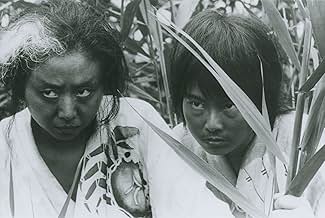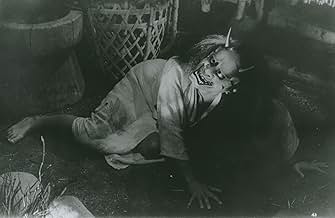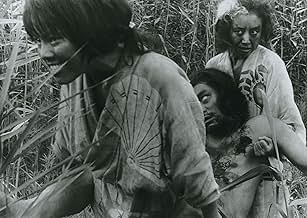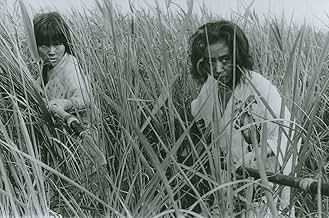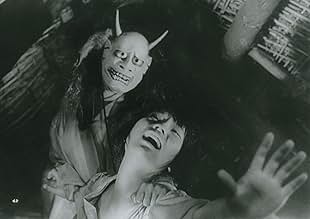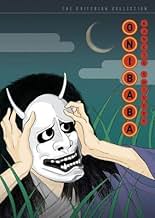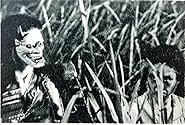Deux femmes tuent des samouraïs et vendent leurs biens pour gagner leur vie. Alors que l'une d'entre elles a une liaison avec son voisin, l'autre rencontre un mystérieux samouraï portant un ... Tout lireDeux femmes tuent des samouraïs et vendent leurs biens pour gagner leur vie. Alors que l'une d'entre elles a une liaison avec son voisin, l'autre rencontre un mystérieux samouraï portant un masque étrange.Deux femmes tuent des samouraïs et vendent leurs biens pour gagner leur vie. Alors que l'une d'entre elles a une liaison avec son voisin, l'autre rencontre un mystérieux samouraï portant un masque étrange.
- Récompenses
- 2 victoires au total
Avis à la une
Onibaba is a supernatural horror film based on a Buddhist fable. It's about a couple of women in feudal Japan surviving the hardships of war by murdering and robbing stray samurais who wander unwittingly into their path. Their domain is a huge field of tall reeds with an ominous deep hole at its centre where they dispose of the unfortunate men they kill. Things are complicated when a male neighbour returns from the war and unleashes sexual tensions within the women which ends in horror. And that is to say nothing of the demon mask...
Onibaba is an artistically strong piece of cinema. From the outset the film is aurally intense, with repetitive beating drums announcing the beginning of the tale. The widescreen frame is consistently used brilliantly, with beautifully lit black and white photography. From the constantly swaying reeds to the close-ups of the protagonist's faces, the visuals capture the mysterious yet ominous beauty of the natural world, while emphasising the intense emotions of the protagonists. The setting ensures that the atmosphere is one of claustrophobia. In fact one of the themes of Onibaba is the way that the natural landscape can shape the way we are. The field of reeds allows the women to get close enough to kill warriors; it is one of the things that shapes them into killers, as it allows them to murder at will undetected. Similarly, the film is an allegory on capitalism. The war has forced these starving women to find their own way to survive the hardships all around them. They take extreme measures to feed the capitalist machine, as they murder and sell on that which they steal to a local low-life. Capitalism has dehumanised them and the black hole in the centre swallows up the victims. But aside from this, it is an intense human drama intertwined with eerie supernatural horror. The scenes near the end of the film with the demon in the reeds are beautifully creepy. While the horrific curse of the mask results in some scary and disorientating final scenes. In addition, there is a powerful depiction of female sexuality. These women are no shrinking violets. They are aggressive, amoral and deadly.
Onibaba is a film that is sumptuous both visually and aurally; yet its characters and story are devoid of beauty. It's one of the best examples of a horror art film.
Onibaba is an artistically strong piece of cinema. From the outset the film is aurally intense, with repetitive beating drums announcing the beginning of the tale. The widescreen frame is consistently used brilliantly, with beautifully lit black and white photography. From the constantly swaying reeds to the close-ups of the protagonist's faces, the visuals capture the mysterious yet ominous beauty of the natural world, while emphasising the intense emotions of the protagonists. The setting ensures that the atmosphere is one of claustrophobia. In fact one of the themes of Onibaba is the way that the natural landscape can shape the way we are. The field of reeds allows the women to get close enough to kill warriors; it is one of the things that shapes them into killers, as it allows them to murder at will undetected. Similarly, the film is an allegory on capitalism. The war has forced these starving women to find their own way to survive the hardships all around them. They take extreme measures to feed the capitalist machine, as they murder and sell on that which they steal to a local low-life. Capitalism has dehumanised them and the black hole in the centre swallows up the victims. But aside from this, it is an intense human drama intertwined with eerie supernatural horror. The scenes near the end of the film with the demon in the reeds are beautifully creepy. While the horrific curse of the mask results in some scary and disorientating final scenes. In addition, there is a powerful depiction of female sexuality. These women are no shrinking violets. They are aggressive, amoral and deadly.
Onibaba is a film that is sumptuous both visually and aurally; yet its characters and story are devoid of beauty. It's one of the best examples of a horror art film.
Set during a very dark time of war,where weapons and food are the items of barter due to their scarceness, which sees two different Emperors on the throne of Japan and Kyoto destroyed by fire
.our story is that of a Mother and her Daughterin-law who have been left on their own to fend for themselves while the son/husband of our main protagonists is away at war
.The Mother and daughter duo take care of themselves by killing any stray Samurai/warrior that passes their way and stripping them of their armour and weapons which they then trade for millet from the unscrupulous Ushi. One night Hachi a neighbour who had been at war with the missing Husband/son arrives at their hut in a very bedraggled state and tells them of his untimely death.The women are distraught
..Hachi has made his intentions clear he wants the daughter-in-Law as his woman
The Mother afraid of being left alone warns the daughter off
.The ensuing drama is a tale of their sexual tension in the high summer heat, which is exemplified by the swaying of the reeds/grass, the faster the reeds blow in the wind the higher the sexual tension .The mother plays on the fears of the daughter by telling her tales of Demons who prey on those who do wrong
.the wrong being sex outside of marriage, but this is just a smokescreen as the mother throws herself at Hachi and asks him to sleep with her
Hachi refuses, this is the final straw for the mother.The mother meets a Samurai General who is lost in the reeds, she kills him and takes the very scary Demon mask which he wore and wears it herself each night to scare the daughter when the daughter sneaks out for her nightly fix of lust with Hachi. This a very technically proficient film, not really a horror film until arguably the films last quarter
..it has surprisingly a lot of nudity which is not intrusive but is put there by Shindo to show that nudity is not really an issue for someone who has to kill every day just to survive. Shindo also uses Black and White to stunning effect at a time when it was probably easier to film in colour
..this is not a horror masterpiece
This is a Cinematic Masterpiece!
To describe this film in one word, that word would have to 'wow', or something to that effect. In short, Onibaba is an absolutely spectacular cinematic spectacle, and one that has few equals in it's field. In fact, it's the perfect fusion between art-house cinema and atmospheric horror! Loosely based on a Buddhist fable, Onibaba tells a story of lust, envy, wrath and betrayal which is wrapped up by way of a hideous demon mask. Onibaba is a human drama before it's a horror movie - all the character actions are driven by their various needs and wants, and the all the comeuppance emancipates from there. The characters and their actions are constantly fascinating, and it's that which predominantly keeps the film alive. We follow a mother and her daughter-in-law; a couple that are forced to eke out an existence in war torn Japan by killing passing samurai's and selling their belongings for food. Their existence is upset one day, however, when the son's friend, Hachi, returns from the war to the place where the two women live.
The title of the film roughly translates into English as 'demon woman', and that is an apt title for this story. Although the film doesn't contain any actual demons or other mythical creatures, the real horror comes from the character actions and the film succeeds as a horror film in that way. The atmospheric location, which consists of a huge area covered in reeds, adds weight to film's claim to the horror genre also and the location provides a truly stunning set for this story to take place. The film also features a dark pit, which the women use to dump the bodies of the Samurai they kill, which adds to the fantasy and inventive element of the story. The film is cinematic poetry on many levels, from the bleak yet beautiful cinematography, to the elements of the location mentioned - all the way down to it's central piece of imagery - the mask itself. The mask is the film's centrepiece, and the part's where it features are the most memorable of the movie.
Prolific Japanese director Kaneto Shindô takes us on a tour-de-force of atmospheric direction. He spends a fair amount of time focusing on the reeds blowing in the wind and many of his angles focus on the sky, which will no doubt irritate the less adept viewers amongst us - but the rest of us know that this is a way for Shindô to aptly portray his setting, and every instance when he did that was a delight for yours truly. There are many great shots in this movie, and if you're a fan of technical prowess, Onibaba is your film; and even if you're not, this film is a must see.
The title of the film roughly translates into English as 'demon woman', and that is an apt title for this story. Although the film doesn't contain any actual demons or other mythical creatures, the real horror comes from the character actions and the film succeeds as a horror film in that way. The atmospheric location, which consists of a huge area covered in reeds, adds weight to film's claim to the horror genre also and the location provides a truly stunning set for this story to take place. The film also features a dark pit, which the women use to dump the bodies of the Samurai they kill, which adds to the fantasy and inventive element of the story. The film is cinematic poetry on many levels, from the bleak yet beautiful cinematography, to the elements of the location mentioned - all the way down to it's central piece of imagery - the mask itself. The mask is the film's centrepiece, and the part's where it features are the most memorable of the movie.
Prolific Japanese director Kaneto Shindô takes us on a tour-de-force of atmospheric direction. He spends a fair amount of time focusing on the reeds blowing in the wind and many of his angles focus on the sky, which will no doubt irritate the less adept viewers amongst us - but the rest of us know that this is a way for Shindô to aptly portray his setting, and every instance when he did that was a delight for yours truly. There are many great shots in this movie, and if you're a fan of technical prowess, Onibaba is your film; and even if you're not, this film is a must see.
This particular flick caught my attention with the box description of
"an old woman and her nubile young daughter lure unwary samurai into a
wheatfield to rob and kill them." Well, there wasn't much luring...most
of the samurais were just unlucky enough to wander into the old woman
and nubile young daughter's home territory...but the movie was still a
superb little find...in a suburban Blockbuster Video, of all places!
This movie, which I found to be faster paced than most Japanese period
pieces, is just DRIPPING with weird psychological overtones. The story
involves an old woman and her daughter-in-law living off the spoils of
wars. Various samurai from countless wars are always stumbling into
these bandits' territory and to be summarily jacked for their armor and
weapons. It's one big happy family until an old comrade of the
daughter's husband returns home and reports that the daughter's husband
is dead. We're never really sure if this man killed the husband or
not...but that issue is soon is overshadowed by the sexual tension of
two women who haven't been with a fella for some time. Eventually, the
nubile young daughter helps herself to this new lover, much to the
jealous rage of her mother-in-law. So the old woman hatches a scheme to
separate these two lovers...but keeping them apart is as difficult as
keeping apart two dogs in...well, you get the idea.
The cinematography of this film is excellent. Each shot is meticulously
and lovingly shot, building the tension and supplying the canine
symbolism. The music is unusual too...it starts off with some hepcat
bebop and then regresses into what I can only guess is theme music for
an oni (Japanese ogre).
I would highly recommend Onibaba for those evenings where everyone
feels a need to be disturbed and entertained at the same time. It also
doesn't hurt that Jotsuki Yoshimuru, who plays the daughter-in-law,
happens to be drop dead gorgeous...in a punk rock sort of way. You'll
see what I mean when you check out this flick.
I doubt you'll find this flick at Blockbuster Video...unless you find
one in the middle of a wheat field.....
Wow,I saw this movie on Cable recently.Both of the women in this story are just trying their best to get by and survive in a bad situation.I could tell it was on a limited budget but very well written.It was erotic with frontal nudity and even filmed in the 60's.It had me on the edge of my seat the whole time.I was trying to figure out where they were going with the whole thing.I kept trying to decide if I sympathized with the old woman more than the young one.Then at the end I felt sorry for both of them.What a great story.This one needs to be on Cable more often.This one is a must see even for people who only like contemporary films.I would recommend it to anyone.
Le saviez-vous
- AnecdotesOnibaba's literal meaning is demon hag or old devil woman.
- GaffesThe orientation of how Hachi holds his spear while talking to the young woman and the old woman changes from cut to cut. At times he has his arm extended and other times his elbow is bent.
- Versions alternativesOriginally cut in England when released in 1968, though the video releases are uncut.
Meilleurs choix
Connectez-vous pour évaluer et suivre la liste de favoris afin de recevoir des recommandations personnalisées
- How long is Onibaba?Alimenté par Alexa
Détails
Box-office
- Montant brut mondial
- 689 $US
- Durée1 heure 43 minutes
- Couleur
- Mixage
- Rapport de forme
- 2.35 : 1
Contribuer à cette page
Suggérer une modification ou ajouter du contenu manquant



